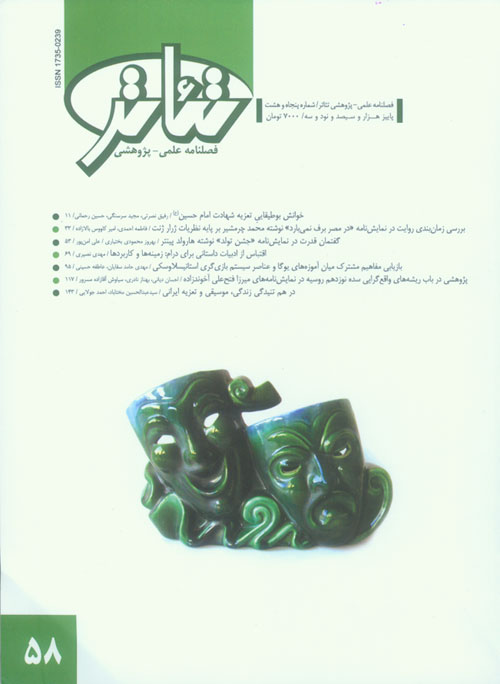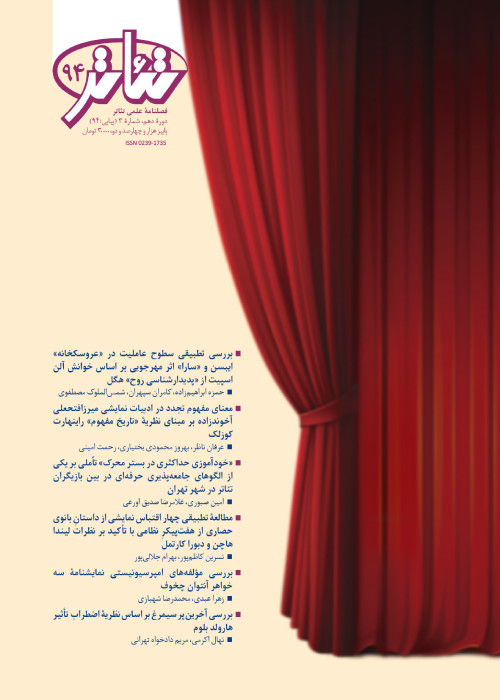فهرست مطالب

نشریه تئاتر
سال یکم شماره 58 (پاییز 1393)
- 176 صفحه، بهای روی جلد: 70,000ريال
- تاریخ انتشار: 1394/02/15
- تعداد عناوین: 8
-
-
صفحه 7
-
Page 11After the traditional philology revolutionized by Ferdinand-de-Saussure, and a new structuralist approach toward language established by him, different branches of science were influenced and new forms and tendencies emerged among them. Anthropology, psychology, and even the natural sciences like physics and chemistry, couldn’t escape from this influence. Naturally, literature, which inherently depends on language, became more influenced and so many of the literary researchers began to redefine the literary science, using Saussure’s doctrine. Among these all, Russian formalists and French structuralists were two main groups which widened their research’s area and have been accepted in academic circles. On the two opposite sides of Europe, Russian formalist, such as Viktor Shklovsky, Boris Tomashevsky, and Boris Eikhenbaum, and French structuralists, such as Roland Barthes, Gérard Genette, and Lucien Goldmann, applied Saussure's thought in literature theory and criticism. While between the members of either groups there was not any complete agreement on how to use Saussure's ideas, in the end they all had the same theoretical foundation based on saussurean linguistics. TzvetanTodorov succeeded to create a genuine combination of formalist and structuralist approaches. One of these methods, which is nominated as poetic reading has been elaborated in his book, “Poetique”. On one hand, using formalist approach, he underscores the language of a literary work, andon the other hand, he confines strulturalist approach to the very framework of literary work and overlooks anything outside the text. So, Todorov creates precise reading system of a work and calls it poetic reading, which investigates for universal postulates that have been manifested in specific literary works. In this article, we have tried to achieve a poetic reading of the Husaynibn Ali’s Tàzieh, using Todorov’s method. Poetic reading is a precise reading which attempts to analyze all aspects of a text, far from being engaged with paratexts, and determine the function of different aspects in its formation. In the following article, we attempted to shed light on some aspects of the Husaynibn Ali’s Tàzieh, trough poetic reading of the text. In this research, library books on Tàziehhave been used as a resource, and field research in this case was not considered. The nature of this research is descriptive, and the reasoning method is comparative. Todorov distinguishes three general aspects of the narrative text, the semantic (semantique), the syntactic (syntaxique), and the rhetorical (verbal). In the following article, semantic, syntactic and verbal aspects of Husaynibn Ali’s Tàzieh are studied, using viewpoints of Todorov.Keywords: Tazieh, Todorov, Poetics, Reading, Structuralists
-
Page 33In the recent decades of discussion on narrative and narrative is important for researchers to conside and many hunters have commented on the story and its elements. Gerard Genette is one of those people whose ideas regarding the time element in the narrative elaborating. In the words of Paul Ricoeur, Time and so abstract that it is very difficult to understand, but it is one way to objectively and concretely, it helps to understand these elements, the play's action. Gerard Genette based onathe actions in terms of the discrepancy between the story and the text, their comments raised And that the relationship between the story and the text is divided into three types: 1- order 2- Continuity 3- frequency. In this paper, we attempt to build on this theory, the snow has stopped falling Muhammad Leather Tap Plays in Egypt to review.Keywords: narrative, the narrative, Genette, regularity, continuity, frequency, in Egypt, the snow stopped falling
-
Page 53Harold Pinter is widely regarded as one of the most influential representatives of British theatre in the twentieth century. The significance of his tremendous contribution to modern theatre has been summed up in one theatrical terminology, namely, “Pinteresque”. Though Pinter’s plays are characteristic of minimal plots and limited characters, the dialogues are filled with powerful tension. Power, however, is not only an important element, but also a recurrent theme in his plays in many ways. Indubitably, there are power struggles between dominating and dominated characters in his plays. Aligned with the French philosopher Michel Foucault’s theory of discourse and power, this article analyzes one early play by Harold Pinter, The Birthday Party, arguing that the characters in this play possess strong desire for power, which makes them aware of the menace all around. What is more, the reflection of power exhibited in The Birthday Party anticipates Pinter’s radical anti-hegemony politics in his later period.Keywords: Harold Pinter, Michel Foucault, Power, Discourse
-
Page 69Changing short stories and novels to drama is one of the most important strategies of increasing the capacity of drama which can provide connections between these two fields of literature in favor of drama. Adaptation is always done in different cultures and gives some characteristics and capacities of fictional literature to dramatic literature. So adaptation could promote the capacity and potentiality of the drama. For this reason and because of the importance of adaptation in literature, this research wanted to investigate and analyze the dramatic adaptation from fictional literature. This study tries to find the answer to the question that in adaptation path which components could change from fictional structure to dramatic structure. And "transfer" and "transformation" how could find importance with what capacity in adaptation process. Based on these studies, firstly, the investigation was conducted on the structure of literature and drama and then on similarities and difference between these two structures and in this way some issues of dramatic adaptation from fictional literature investigated. To reveal the importance of this research the various conducted adaptations should be mention here. So this functional analytical research gives information about adaptation to play writers and investigates the probable weaknesses and short comings of adaptation process. The theoretical basis of this study is upon the structure of fictional literature and drama. It is used of library method. The used references have been studied in identifying and evaluating the structure of fictional literature and drama theoretically and scientifically. This research seeks to highlight the adaptation methods with the look to similar elements in structure of fiction, drama and other kind of art. So it is tried in this study to investigate and evaluate similarities between fiction and drama by analytical and descriptive method.Keywords: Adaptation, narrative, Dramatic Literature, Fictional Literature
-
Page 95Western theater is deeply indebted to Stanislavsky’sActing system Who did a lot of efforts to make his acting exercises into a systematic method. Since putting the experiences as a theoretical principals in writing is a difficult task, He was obliged to present acting training books in the form of novels. On the whole, these books are considered as coherent thought within the scope of acting In which all rehearses and techniques are rooted in aforementioned thoughts. One of the most important of these, is the belief in the connected chainlike relationship between mind and body, his belief is based on theTheodulRibot- French psychologist statement whose emphasis on this issue brings him into this assumption that stress is a major obstacle to creativity but was this the most important and the only source of Stanislavski inspiration to form the system? From the view point of theorist such as G0rdon and Carnac, the most important section of the system rehearsal is Stanislavsky’s information to yoga. This article tends to mention the reason of the existence of the challenges that today has created obstacles for Stanislavsky’s training method and to identify the way out of this challenge. Grachev who is a professional acting trainer in Russia today due to getting rid of the challenge introduces the missing link as a yoga, which the ruling censorship on the pervious socialist USSR made Stanislavski remove such term as yoga inspiration, Prana, witness. This article tends to answer the fundamentals through a descriptive and analytical way.1. How are the use yoga practice of reflected in Stanislavsky's acting system?2. How did Stanislavsky become familiar with yoga and which aspects of yoga have had the most impact on his system?3. Which common elements can be found in Stanislavsky’s teaching and yoga practice? Our sources include Research materials of library studies, internet and the result of the total experience of the author in the area of teaching acting and also holding yoga educational workshop. In this article we try to analyze the Stanislavsky's utilization of yoga with regard to his acting system. In addition, the eight stage of yoga Ashtanga is dealt with, and then the common elements between the two Stanislavsky's acting system and Ashtanga yoga are identified and studied such as the ethics, muscle flexibility,breathing, concentration, imagination, communication, energy and rhythm. It should be mentioned that this study has been carried out for the first time in countries.Keywords: stanislavskyssystem, Yoga, Ashtanga yoga, concentration, Parana, breathing, muscle flexibility
-
Page 117This research attempts to trace and investigate the both mediated and immediate impacts of Russian realism on plays of Mirza Fathali Akhundzadeh (1812-1878) with regard to the concurrence of these plays’ publication in Caucasus and the primary efforts of Russian realists who had risen under the influence of Vissarion Belinsky (1811-1841) and against “Art for Art’s Sake” thought skull and Russian Slavophilists. The documents of this research has been examined and collected through notions of Belinsky and other Russian realist critics, Akhundzadeh’s epistle under the title of “Maktubat” and his plays which were translated to Persian by Mohammad Djaafar Qarachedaqi. Structurally, this article begins with studying the influences of the ideas of 19th century Russian modernists on Akhundzadeh’s heterodox views and next to analyzing these intellectuals’ most prominent notions, in a comparative procedure, tries to reinvestigate the possible influences of the aforementioned literary current on Akhundzadeh’s votes reflected in his dramatic texts or non-dramatic ones.Keywords: M. Fathali Akhundzadeh, Russian Realist critics, Vissarion Belinsky, Modernism, Playwriting in Qajar era
-
Page 143World is full of silence and needs David ‘s voice. Music is a moral honor which is the spirit of world, the wings of thought and the ability to go through imagination and attracting sadness and happiness and it is something which gives life to everything. The essence is a discipline which promotes itself with anything which is good, true and beautiful. Although it is invisible but it looks stunning, gorgeous and immortal. Music has various dimensions as scientific, theoretical and practical dimensions. According to Avicenna, music is a mathematical science which talks about gentleness and harshness of songs and the time between songs which is used to discover how (tone) should be written. Music could be investigated in different aspects as martial music, festive music, religious music, work music and etc. Here the main consideration is on the aspects of music which is related to Tazzieh and its characteristics.Keywords: Music, Tazzieh, music set, Tekye, song


